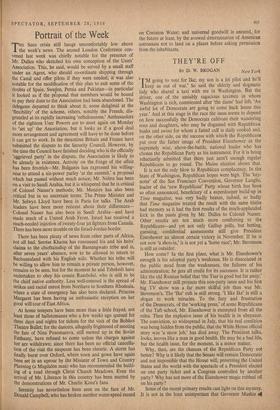Portrait of the Week
THE Suez crisis still hangs uncomfortably low above 1 the week's news. The second London Conference con- vened last week was chiefly notable for the presence of Mr. Dulles who sketched his own conception of the Users' Association. This, he said, would be served by a small staff under an Agent, who should co-ordinate shipping through the Canal and offer pilots if they were needed; it was also notable for the modification of this plan to suit some of the doubts of Spain, Sweden, Persia and Pakistan—in particular it looked as if the proposal that members would be bound to pay their dues to the Association had been abandoned. The delegates departed to think about it, some delighted at the 'flexibility' of the scheme, others, notably the French, dis- gruntled at its rapidly increasing 'nebulousness.' Ambassadors of the eighteen User Powers are to meet again on Monday to 'set up' the Association, but it looks as if a good deal more arrangement and agreement will have to be done before it can get to work. In the meantime Britain and France have submitted the dispute to the Security Council. However, by the time the Council have finished deciding who is the officially 'aggrieved party' in the dispute, the Association is likely to be already in existence. Activity on the. fringe of the affair has been feverish—Mr. Bulganin has expressed his willing- ness to attend a six-power parley 'at the summit,' a proposal which has passed without much notice; Mr. Nehru has been on a visit to Saudi Arabia, but it is whispered that he is critical of Colonel Nasser's methods; Mr. Menzies has also been critical but in no uncertain terms. The Prime Minister and Mr. Selwyn Lloyd have been in Paris for talks. The Arab leaders have been more reticent about their differences— Colonel Nasser has also been in Saudi Arabia—and have made much of a United Arab Front. Israel has received a much-needed injection of twenty-four jet fighters from Canada. There has been more trouble on the Israel-Jordan border.
There has been plenty of news from other parts of Africa, not all bad. Seretse Khama has renounced his and his heirs' claims to the chieftainship of the Bamangwato tribe and is, after seven years' absence, now to be allowed to return to Bechuanaland with his English wife. Whether his tribe will be willing to allow him to remain a private person, however, remains to be seen, but for the moment he and Tshekedi have undertaken to obey his cousin Rasebolai, who is still to be the chief native authority. Less well-omened is the spread of strikes and racial unrest from Northern to Southern Rhodesia, where a state of emergency has also been declared. Princess Margaret has been having an enthusiastic reception on her good will tour of East Africa.
rr At home tempers have been more than a little frayed, not least those of balletomanes who a few weeks ago queued for three days and nights for tickets for the visit of the Bolshoi Theatre Ballet; for the dancers, allegedly frightened of meeting the fate of Nina Ponomareva, still mewed up in the Soviet Embassy, have refused to come unless the charges against her are withdrawn; since there has been no official cancella- tion of the visit the suspense has been electric. A storm has finally burst over Oxford, where town and gown have again been set in an uproar by the Minister of Town and Country Planning (a Magdalen man) who has recommended the build- ing of a road through Christ Church Meadows. Even the arrival of Mr. Liberace in this country has been marred by the demonstrations of Mr. Charlie Kunz's fans.
Serenity has nevertheless been seen on the face of Mr. Donald Campbell, who has broken another water-speed record on Coniston Water; and universal goodwill is assured,, for the future at least, by the avowed determination of American astronauts not to land on a planet before asking permission from the inhabitants.


































 Previous page
Previous page